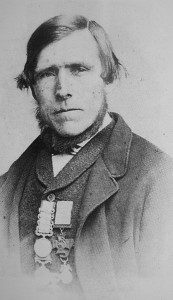Scotland and the Victoria Cross: The Crimea
The War in the Crimea 1854 – 1856
In London’s Hyde Park, 26 June 1857, there was an investiture, a unique gathering with Queen Victoria presenting, while on horseback, the first awards of the Victoria Cross. The Queen was particularly interested in the creation of this supreme award for valour that was founded in 1856. It was Victoria who chose the words “For Valour” to appear on the award rather than the earlier suggested “For the Brave”.
The supreme award for gallantry in the face of the enemy had only just begun its tradition of prestige and honour with 62 awards presented in approximately 10 minutes. Of these awards, made in recognition of personal valour during the war in the Crimea, there were others as in all 111 awards of the Victoria Cross were granted to sailors and soldiers who served Queen and Country in the Crimea 1854-1856.
Of the 62 Victoria Crosses presented at the investiture eleven were presented to Scottish born soldiers. Seven other Scottish-born soldiers awarded the Victoria Cross for the Crimea were not in attendance at the investiture.
The Hyde Park Recipients
Sergeant-Major John Grieve (Recipient 15 of 62)
Balaclava 25 October 1854
2nd Dragoons (Royal Scots Greys) / Heavy Brigade
Born Musselburgh, East Lothian, Scotland (3 May 1821)
Corporal John Ross (Recipient 25 of 62)
Sebastopol 21 July 1855
Corps of Royal Engineers
Born Inch, Scotland (1822)
Sapper John Perie (Recipient 27 of 62)
Sebastopol 18 June 1855
Corps of Royal Engineers
Born Huntley, Aberdeenshire, Scotland (1831)
Sergeant James McKecknie (Recipient 36 of 62)
Alma 20 September 1854
Scots Fusilier Guards
Born Paisley, Renfrewhsire, Scotland (June 1826)
Private William Reynolds (Recipient 37 of 62)
Alma 20 September 1854
Scots Fusilier Guards
Born Edinburgh, Scotland (1827)
Lieutenant William Hope (Recipient 39 of 62)
Sebastopol 18 June 1855
7th Regiment of Foot
Born Edinburgh, Scotland (12 April 1834)
Private Samuel Evans (Recipient 44 of 62)
Sebastopol 13 April 1855
1st Battalion, 19th Regiment of Foot
Born Paisley, Renfrewshire, Scotland (circa 1821)
Captain Charles Lumley (Recipient 53 of 62)
Sebastopol 8 September 1855
2nd Battalion, 97th Regiment of Foot
Born Forres, Morayshire, Scotland (1824)
Captain Sir William James Montgomery-Cuninghame (Recipient 58 of 62)
Sebastopol 20 November 1854
1st Battalion, Rifle Brigade
Born Maybole, South Ayrshire, Scotland (20 May 1834)
Sergeant John Simpson Knox (Recipient 59 of 62)
Alma 20 September 1854
Scots Fusilier Guards
Born Glasgow, Scotland (30 September 1828)
Private Roderick McGregor (Recipient 60 of 62)
Sebastopol July 1855
1st Battalion, Rifle Brigade
Born Inverness, Scotland (1824). Also given as Dunain, Highland, Scotland (1822)
Not in Attendance
Sergeant Henry Ramage
Balaclava 25 October 1854
2nd Dragoons (Royal Scots Greys) / Heavy Brigade
Born Morningside, Edinburgh, Scotland (1827)
Private Thomas Beach
Inkerman 5 November 1854
2nd Battalion, 55th Regiment of Foot
Born Dundee, Scotland (24 January 1824)
Private John McDermond
Inkerman 5 November 1854
1st Battalion, 47th Regiment of Foot
Born Glasgow, Scotland (1832)
Colour-Sergeant Henry MacDonald
Sebastopol 19 April 1855
Corps of Royal Engineers
Born Inverness, Scotland (28 May 1823)
Captain Thomas de Courcy Hamilton
Sebastopol 11 May 1855
1st Battalion, 68th Regiment of Foot
Born Stranraer, Scotland (20 July 1825)
Colour-Sergeant Peter Leitch
Sebastopol 18 June 1855
Corps of Royal Engineers
Born Orwell, Kinross, Scotland (August 1820)
Colour-Sergeant James Craig
Redan 6 September 1855
3rd Battalion Military Train
Born Perth, Scotland (10 September 1824)
The Crimea is where the sons of Scotland first came into contact with the legend that would become the Victoria Cross. More awards would follow shortly afterwards during the Indian Mutiny 1857 – 1858.
For your interest a video clip from the National Army Museum, the Crimean War campaign journal of Lieutenant Mark Walker V.C., 1st Battalion, 20th Regiment of Foot. Awarded the Victoria Cross for his actions at Inkerman, 5 November, 1854. Walker was born, 24 November 1857, at Gore Port, Finca County, Westmeath, Ireland.


Comments